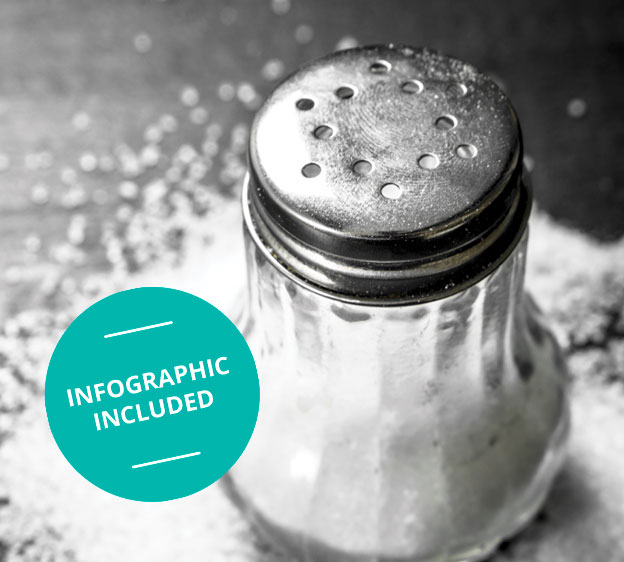Foods to Avoid with High Blood Pressure
December 19, 2023
If you are someone who frequently has high blood pressure after eating, you may be wondering which foods to avoid if you want to reduce blood pressure. While a number of unchangeable factors, such as genetics and family history, can contribute to hypertension, you can maintain a healthy blood pressure level by altering your diet. When it comes to different types of food to avoid with high blood pressure, it is important to steer clear of too much salt or trans fat.
Learn how to recognize which foods you should avoid and how to replace them with healthier alternatives.
Read More: The Links Between High Blood Pressure and Heart Disease
Understanding Which Foods to Avoid
According to the Centers for Disease Control and Prevention, most Americans age two and older consume a higher amount of sodium than is recommended. When you consume too much salt, your blood vessels’ ability to dilate becomes impaired, which can lead to complications such as heart disease, strokes and other medical conditions. Additionally, if you consume too much trans fat, you will raise your cholesterol levels, which can contribute to hypertension.
It can be helpful to recognize which categories of food you should avoid based on ingredients. If you know that too much sodium raises blood pressure, you can steer clear of salty foods. When avoiding foods that raise your blood pressure, pay attention to:
- Saturated fats. If you consume too much food that is high in saturated fat, you heighten your risk of developing high cholesterol, which may eventually lead to stroke or heart attack. To avoid saturated fats, steer clear of beef, lamb and excessive amounts of butter.
- Alcohol. Consuming too much alcohol places you at a higher risk for heart disease. By limiting your alcohol consumption, you can save yourself many health complications.
- High amounts of sugar. You should avoid sugary foods, as sugar causes weight gain, which contributes to hypertension. Too much sugar may also cause diabetes and tooth decay.
- Processed meat. Hot dogs and other processed meats that contain preservatives can place you at a higher risk for hypertension than regular unprocessed meats. In addition to containing preservatives, processed meats contain high amounts of sugar, fat and salt, all of which contribute to hypertension.
- Canned tomato products. Keep in mind that most canned tomato products, including pasta sauce, are high in sodium. Consider substituting them for something else.
- Caffeine. Caffeine raises your risk of high blood pressure significantly. It is particularly important not to drink more than four cups of coffee or another caffeinated beverage a day.
- Dairy products. While milk, cheese and other dairy products may have health benefits, they are also high in saturated fat. For instance, you can improve your bone and muscle health by eating small amounts of cheese. The key is to avoid overconsumption.
For those who track their blood pressure through regular readings, keep in mind that your blood pressure tends to rise right after you finish eating. If you want an accurate blood pressure reading, it is important that you don’t eat 30 minutes prior to your reading. Additionally, according to a study in BMC Public Health, spicy foods may make your blood pressure rise or diminish overall cardiovascular health. Be mindful of your spicy food intake as you go to measure your blood pressure levels.
Read More: Answers to Your Questions About Blood Pressure Medication Side Effects
Tips for Lowering Your Blood Pressure
Thankfully, if you experience hypertension, there are several ways to lower your blood pressure. For instance, you can replace the salt and trans fats in your diet with healthier alternatives.
If you’re looking to promote healthy blood pressure levels, the National Council on Aging proposes eating more:
- Berries
- Beets
- Whole grains
- Sweet potatoes
- Unsweetened yogurt
- Pistachios
- Bananas
In addition to changing up your diet, you can make other lifestyle changes to help you avoid hypertension. But if you do have hypertension, you can relieve symptoms by exercising regularly, which can also get rid of stress and improve heart health. Additionally, if you have a history of hypertension, your health care provider will prescribe blood pressure medication that you can take to manage your levels.
“You can also do a lot to lower your blood pressure by learning to manage stress,” says Tara Kay, MMS, PA-C, of Beaufort Memorial Heart Specialists. “And there are, of course, many different ways you can do that. Physical activity is a big one, but you can take a lot of stress off yourself by practicing good time management skills and maintaining a healthy perspective.”
When it comes to keeping a healthy perspective, it’s important to surround yourself with loved ones who will uplift you. You should also strive to be in a good mental headspace, valuing your time and not overcommitting yourself. Finally, you can decrease your risk of heart disease and hypertension by taking 15 to 20 minutes a day to relax. Overall, maintaining a healthy, stress-free attitude and a diet that promotes a healthy lifestyle are key factors in helping you maintain healthy blood pressure levels.

Are you concerned about your blood pressure and its impact on your heart and vascular health? Contact a health care provider today to learn how Heart and Vascular Care at Beaufort Memorial can best serve you.

